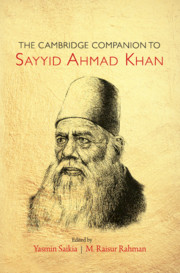Book contents
- Frontmatter
- Contents
- List of Figures
- Notes on Contributors
- Acknowledgements
- A Note on Spellings and Transliteration
- Chronology of Sayyid Ahmad Khan
- Introduction
- Part I Sayyid Ahmad Khan: The rise of a historical figure
- Part II Musalman-e Hind: Indian Muslim in a plural environment
- Part III Sir Sayyid today: Enduring legacies
- 10 Bridging the Past and the Present: How Sir Sayyid Speaks to the Twenty-First Century Protestors
- 11 Darwin or Design? Examining Sayyid Ahmad Khan's Views on Human Evolution
- 12 Loss and Longing at the Qila Mu'alla: Āṣār-us Ṣanādīd and the Early Sayyid Ahmad Khan
- 13 A Living Legacy: Sir Sayyid Today
- Conclusion
- Suggested Further Readings
- Index
13 - A Living Legacy: Sir Sayyid Today
from Part III - Sir Sayyid today: Enduring legacies
Published online by Cambridge University Press: 26 April 2019
- Frontmatter
- Contents
- List of Figures
- Notes on Contributors
- Acknowledgements
- A Note on Spellings and Transliteration
- Chronology of Sayyid Ahmad Khan
- Introduction
- Part I Sayyid Ahmad Khan: The rise of a historical figure
- Part II Musalman-e Hind: Indian Muslim in a plural environment
- Part III Sir Sayyid today: Enduring legacies
- 10 Bridging the Past and the Present: How Sir Sayyid Speaks to the Twenty-First Century Protestors
- 11 Darwin or Design? Examining Sayyid Ahmad Khan's Views on Human Evolution
- 12 Loss and Longing at the Qila Mu'alla: Āṣār-us Ṣanādīd and the Early Sayyid Ahmad Khan
- 13 A Living Legacy: Sir Sayyid Today
- Conclusion
- Suggested Further Readings
- Index
Summary
In one of the first interviews I conducted in Aligarh, retired Aligarh Muslim University (AMU) professor of English Asloob Ahmad Ansari described Sir Sayyid Ahmad Khan ‘as the greatest benefactor of the Muslims in the last several years’. He quickly edited the scope of his comment by adding, ‘or centuries, I should say’. This temporal slip of the frame is more than incidental, and it reappears in much of the current thinking among those sympathetic to Sir Sayyid's educational mission. It captures the perception that Sir Sayyid's work is temporally transcendent – it was born of his moment and remains relevant to the current one. He represented the Aligarh ideal – faithful, educated, generous, dedicated to the cause of Muslim uplift, and progressive – as he pushed against lurking conservatism within the Indian Muslim community. In the Muhammadan Anglo-Oriental (MAO) College, which became AMU in 1920, Sir Sayyid sought to cultivate Muslim men, who embodied these characteristics and were well prepared for public life.
The lasting legacy of Sir Sayyid's work is best exemplified by AMU, as one respondent said, ‘He IS AMU.’ When graduates and well-wishers of AMU reflect on the role and legacy of Sir Sayyid, his objective of Muslim uplift seems as vital to Indian Muslims today as it was when he founded MAO College in 1875. Responses from surveys and oral history interviews with former students and professors demonstrate that Sir Sayyid's mission to develop a modern educational system for Muslims was both visionary and resilient. While the university has been indispensable in advancing the cause of Muslim education, through their attachment to the need to advance Sir Sayyid's educational agenda continually, these former students suggest that his goals remain unfulfilled.
AMU graduates, distinguished by the appellation, ‘Alig,’ are spread among all South Asian states, and indeed, the world. The oldest surviving generation of Aligs comprises those who were students during the upheavals of independence and partition in the 1940s, who settled in the newly independent states. The younger generations of Aligs, since the 1960s, are primarily Indian or they are from outside the subcontinent. Since the 1950s, few Aligs have been from Pakistan or Bangladesh.
- Type
- Chapter
- Information
- The Cambridge Companion to Sayyid Ahmad Khan , pp. 255 - 272Publisher: Cambridge University PressPrint publication year: 2019



